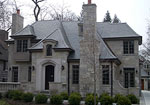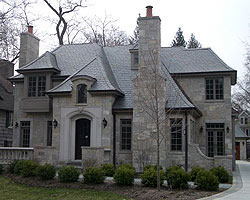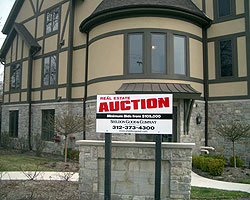|
|
The builders who completed a new 4,000-square-foot house on Pine Street in Winnetka last year had hopes of selling it for around $3.2 million. But the real-estate market fell progressively downward, until eventually the builders had no idea what the house was worth anymore. In March, they found out: It sold for $1,926,000, or 39 percent less than they had hoped.
The real-estate auction house Sheldon Good & Co. sold the property for the builders in an unusual way. Rather than start at a low figure and let competing bidders take the price up, Good opened the bidding high to let bidders pull it down to what they were willing to pay. Steve Good, head of the auction house, says this is referred to as a Dutch auction; it’s the method used to sell flowers in Holland and fish in Japan, he explains.
Starting at an optimistic price and cutting until a buyer speaks up is what many homeowners trying to sell their houses this past year have been doing. Now they know there’s a term for it: a Dutch auction. This method of selling a house, Good says, “is useful because it’s becoming more and more difficult to value real estate, and particularly new construction.” His company will be auctioning other new builder homes this year—but not all of them the Dutch way. Some will be sold at “English” auctions, starting with a low bid and rising from there.
Right now, the only Chicago-area residential property Good has available for bidders to inspect is a nine-condo building on Green Bay Road in Highland Park where the builders haven’t sold a single unit. Starting bids there are $105,000. Good says that on a per-square-foot basis, that’s “about one-third the going rate for condos in Highland Park.”
|
|
The condos’ auction date has not been set yet, but go to sheldongood.com for information on that and future auctions—which Bruce Sayre, an executive vice president at the auction house, says will soon include “a big portfolio” of properties in Jefferson Park and houses in Glenview and Kenilworth. Sayre says he expects to have quite a bit of residential inventory available this year. “We’ve had a serious increase in inquiries from builders, but many of them may not be ready yet,” he says.
But even a Dutch auction may not fully plumb the value of a property. At the auction of the Winnetka house, held in early March, bidding started at $3.2 million and went down incrementally until it reached the builders’ established minimum price, $2.4 million. Nobody bid. “The market rejected the bidding range that our sellers established,” Good says. A week after the auction, a bidder and the builders agreed on a sale price, which was a full 19.75 percent below the lowest price the builders had said they would accept.
At $1.926 million, the house was likely sold at a loss. In April 2006, the builders had paid $1.27 million for the lot and the house that formerly stood there; construction of the new, high-end house—at what three local builders tell me would run a bare minimum of $200 a square foot (and more likely closer to $250 a foot)—would have cost at least $800,000. The builders would have had at minimum $2.07 million into the property, which suggests they sold at a loss of at least 6.9 percent. I could not locate the builders for comment, and neither Steve Good nor Sayre, who was the auctioneer at the Winnetka sale, would comment on these figures.
 The builders who completed a new 4,000-square-foot house on Pine Street in Winnetka last year had hopes of selling it for around $3.2 million. But the real-estate market fell progressively downward, until eventually the builders had no idea what the house was worth anymore. In March, they found out: It sold for $1,926,000, or 39 percent less than they had hoped.
The builders who completed a new 4,000-square-foot house on Pine Street in Winnetka last year had hopes of selling it for around $3.2 million. But the real-estate market fell progressively downward, until eventually the builders had no idea what the house was worth anymore. In March, they found out: It sold for $1,926,000, or 39 percent less than they had hoped. 




